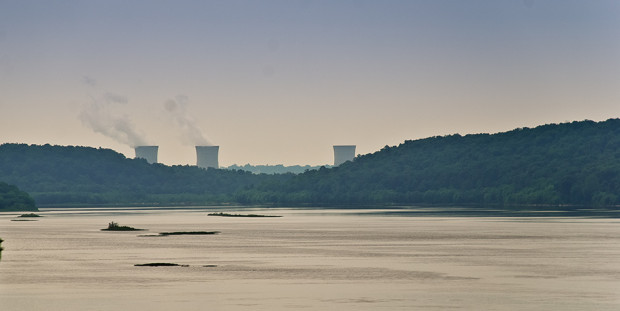Struggling nuclear industry turns to Harrisburg for help
Amid slowing demand for electricity and a glut of cheap natural gas, the nuclear power industry is having a hard time competing.
Last year Exelon’s Three Mile Island plant near Harrisburg didn’t clear an auction for the future sale of its electricity, fueling speculation it could shut down prematurely.
In response, Pennsylvania lawmakers have formed a new Nuclear Energy Caucus. They’re widely expected to introduce legislation later this year, aimed at helping the state’s five nuclear power plants stay online. The bipartisan group held its first meeting last month; it currently has 73 members from both chambers.
“I’m not interested in a subsidy or a bailout approach,” says caucus co-chair Sen. Ryan Aument (R- Lancaster). “I don’t think that’s particularly viable. We need to have a broader conversation about the energy industry in Pennsylvania.”
The group is just getting started this spring. Aument doesn’t expect any legislation to move until the fall.
Sen. John Yudichack (D- Luzerne) says there is no consensus now about how to move forward, only the beginning of a discussion on an industry that provides about 34 percent of the state’s power.
“How do we continue to have the diversity of energy production?” says Yudichak. “How do we keep prices at a reasonable rate? And how do we continue to keep good-paying energy jobs in Pennsylvania?”
Chicago-based Exelon operates three of Pennsylvania’s five nuclear plants and recently hired a new cadre of lobbyists in Harrisburg. According to the Pennsylvania Department of State, seven new lobbyists have joined the company’s roster since January. Many have deep ties to the Republican legislative leadership, including former top aides to House Speaker Mike Turzai (R- Allegheny) and Senate Majority Leader Jake Corman (R- Centre).
Exelon declined an interview request, but in an emailed statement a spokeswoman says the company is looking forward to engaging with the caucus members, “who we commend for their leadership in bringing more focus to nuclear, which provides the lowest cost and most reliable zero-carbon energy source.”
The company has already benefitted from new legislation in Illinois and New York, which provides support through zero emission credits. However, those programs have been challenged in court by competing power producers, arguing they interfere with competitive electricity markets.
It’s still unclear what Pennsylvania lawmakers will do. Options include similar zero emission credits, or changing Pennsylvania’s Alternative Energy Portfolio Standard which requires utilities to purchase a set amount of power from alternative sources like solar, wind.
Michael Bryson is Vice President for Operations at PJM Interconnection—the regional transmission organization coordinating the movement of wholesale electricity for Mid-Atlantic and Midwest. He says PJM is concerned about state subsidies propping up nuclear plants.
“We think it’s important to work with states to figure out resources they are interested in maintaining or developing, to make sure they work with the markets,” says Bryson. “We are concerned about subsidies outside of that kind of coordination, but we’ve been talking with our states about this.”
The developments in Harrisburg are also being watched closely by the natural gas industry, which has been gaining a bigger foothold in electric power generation. David Spigelmyer, president of the gas trade group the Marcellus Shale Coalition, warns against the government “picking winners and losers.”
“Corporate welfare and taxpayer handouts to select industries will increase energy costs for consumers as well as job creators across the Commonwealth, especially manufacturers,” Spigelmyer said in an email. “We need fair, competitive policies that create an even playing field.”
Joe Minott, Executive Director of the Philadelphia-based Clean Air Counsel, says environmental groups are also paying attention.
“I am still trying to understand the amount, the justification for the bailout, and the mechanism that the legislature will propose, if there is enough support for a bailout,” says Minott.
Davitt Woodwell, president of the Pennsylvania Environmental Council says his group has not been directly involved in any discussions, has been monitoring what’s happening in other states.
“We aren’t officially there yet,” he says. “But we’re coming down toward the idea that nuclear has got to be a big part of the energy mix.”
A spokesman for Governor Tom Wolf says he is “monitoring the current situation,” –adding the state needs a diverse energy sector.

















